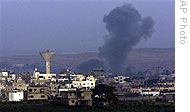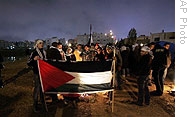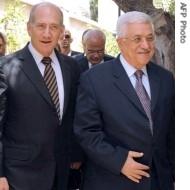voa标准英语2008-Moderates in Middle East May Suffer if Israeli-H(在线收听)
 |
| Smoke rises following an Israeli missile strike in northern Gaza, 30 Dec 2008 |
The violence erupted after a six-month Hamas-Israeli ceasefire expired on December 19. The Palestinian militant group stepped up its shelling of Israeli communities, prompting the massive Israeli response.
Many analysts say this is the biggest military offensive against Gaza since Israel occupied the West Bank and the Gaza Strip in the 1967 Six-Day War. Israel's Defense Minister, Ehud Barak, said the country is currently engaged in an all-out conflict against Hamas.
David Aaron, Director of the RAND Center for Middle East Public Policy, said that rhetoric is all too familiar.
"They [the Israelis] made a basic strategic decision to sort of end it once and for all. Well, unfortunately, we've heard that story before in their invasion of Lebanon [in 2006], which did not eradicate Hezbollah. But it has stopped Hezbollah from carrying out attacks against northern Israel," he said.
The militant group Hamas has been in control of the Gaza Strip since June 2007, after it defeated forces loyal to the moderate Palestinian President Mahmoud Abbas. The United States considers Hamas to be a terrorist group and has accused it of starting this latest round of violence.
Fawaz Gerges is a Middle East expert at Sarah Lawrence College in New York. Speaking from Tripoli, Lebanon, he said the strong Israeli response has radicalized Arab public opinion in the region.
 |
| Jordanian demonstrators hold a Palestinian flag during a protest near the Israeli embassy in Amman, 30 Dec 2008 |
"And it seems to me that the longer the crisis continues, the more radicalized Arab public opinion will likely become. There is no military solution for an essentially political crisis. Regardless of what one thinks of Hamas, the way that Israel has acted in the last few days is playing into Hamas' hands. The military escalation and the extent and the horrendous casualties on the Palestinian side are playing directly into Hamas' hands. They are weakening the moderate forces in the Arab world, particularly America's allies - Egypt, Jordan and Saudi Arabia - and basically supplying ammunition to the so-called resistance front, particularly Iran and Syria and Hamas in Palestine and Hezbollah in Lebanon," argued Gerges.
David Aaron from RAND agreed, saying the crisis puts U.S. allies in the region in a difficult situation.
"It puts them more on the spot because we have given them no coverage. If we had decided to simply call for a ceasefire and stoppage of violence and all the rest, that would have given them some cover. But we didn't. We said, 'This is the fault of Hamas.' Even if that's true, it certainly is not perceived that way in those countries. And so their governments are going to be the target of increased criticism on the part of their people for collaborating with us," he said.
Aaron also said the United States and its allies should be concerned about what may happen on the West Bank. Will there be another intifada, an armed Palestinian uprising against Israeli rule?
Many experts, including Aaron, said the latest conflict was in part due to the Bush administration's Middle East policy.
 |
| Israel's PM Ehud Olmert (l) and Palestinian President Mahmud Abbas in Jerusalem, (file photo) |
"I think it was a complete failure. It didn't do anything, frankly. We did finally get some conversation between [Mahmoud] Abbas and [Israeli Prime Minister Ehud] Olmert. But then nobody knows where that was going and we see this conflict arising now. And it's hard for me to believe that that's going to strengthen the hand of those who want a dialogue with the Palestinians," he said.
The Bush administration says it has been consistently engaged in trying to find a solution to the Palestinian-Israeli crisis.
Fawaz Gerges said one way to come closer to a political solution is to include Hamas in the process. But that, he said, will come about only if there is a different mindset.
"A mindset that says Hamas is not a monolith, that yes, Hamas engages in terrorism, Hamas carries out certain terrorist actions, but Hamas is not just a huge monolith. There are multiple points of view and narratives within Hamas. And political engagement, I would argue, will likely strengthen the moderate elements not only within the region, but also within the Palestinian territories. In fact, I would argue, that a year from now, Hamas will likely remain as strong if not stronger - particularly if Israel and the United States insist on exclusion and on basically pursuing the military option, which basically will not really produce a breakthrough for this essentially political crisis in the region," he said.
Fawaz Gerges and David Aaron said a lot may change between now and January 20 when Barack Obama is officially sworn in as the new U.S. President. But they said one thing is clear - the current conflict proves that finding a political solution to the Middle East crisis should be the first item on President Obama's foreign policy agenda.